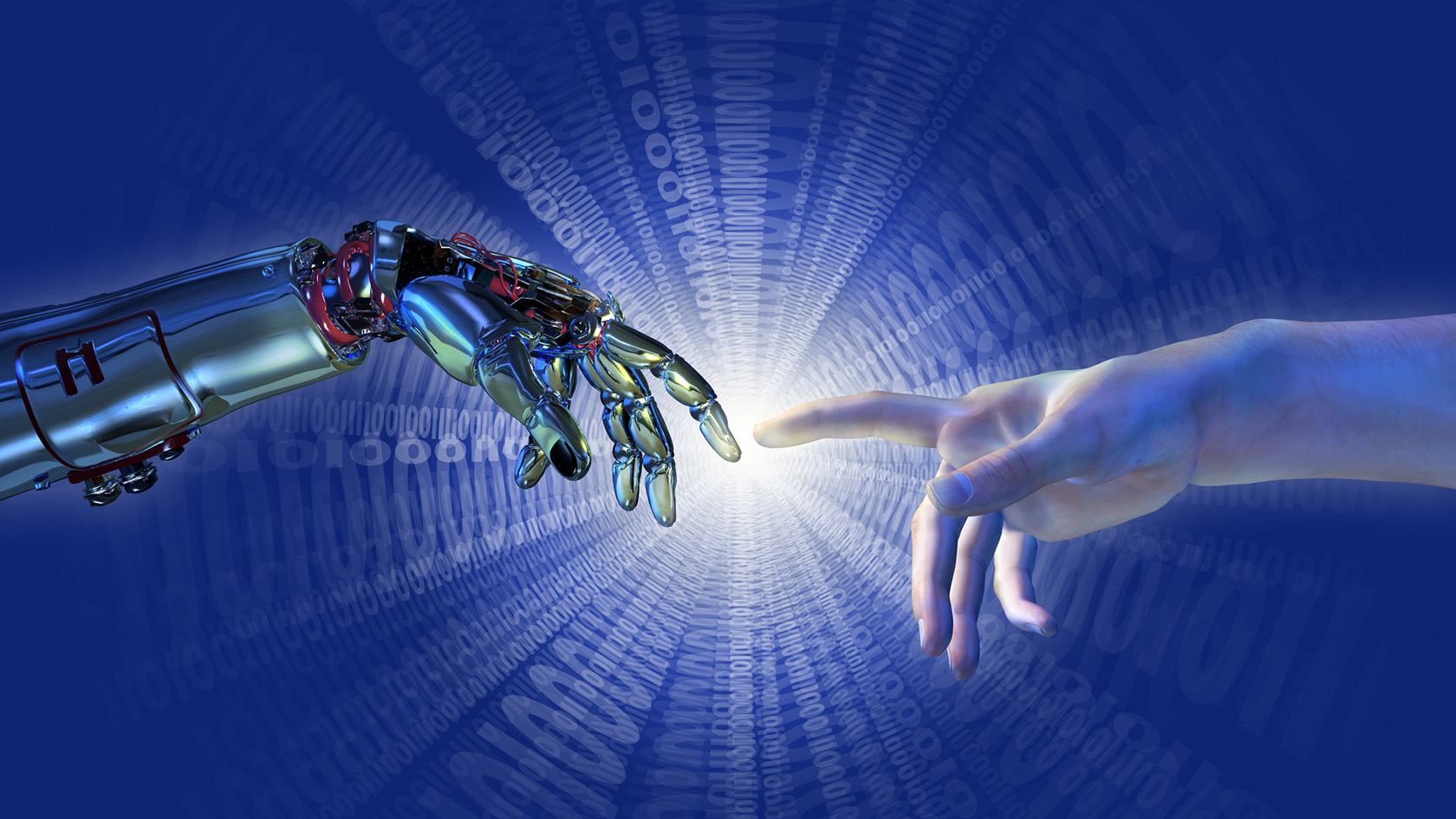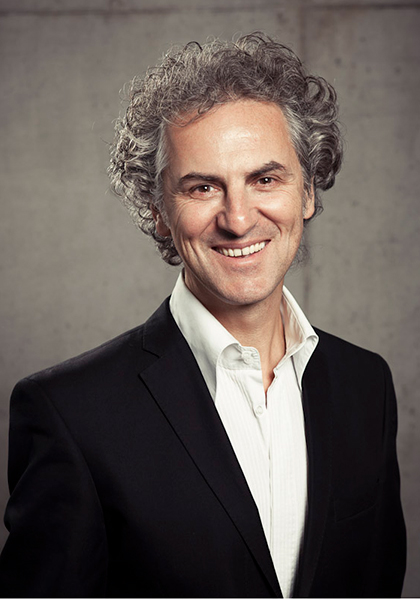“Digital Trinity”

Michael Latzer, you have coined the term “digital trinity”. What do you mean by this rather surprising linking of religion and digitalization?
Michael Latzer: I am trying to look beyond the technical facade of digitalization. My underlying rationale is that digitalization is underpinned by an entire bundle of transformations, which I define as datafication, algorithmization and platformization. I refer to this root system of three closely linked elements as the digital trinity.
Can you elaborate on this?
Latzer: We’re all familiar with the ever-expanding gathering of data and its quantification across many aspects of life – the datafication. The second part of the trinity, the algorithmization of the selection processes, attempts to capitalize on this data socially, economically or politically. The most prominent example of this being artificial intelligence. The third element is the optimal form of organizing the data – the platformization of markets. By this I mean the increasing creation of digital platforms, such as Uber, Google, Airbnb or Tinder. What’s important to me is the co-evolutionary interplay of the three elements. They need to be seen in combination, not separately. It’s only through their interaction that digitalization reaches its potential for comprehensive societal change.
So the term “digital trinity” isn’t intended as a polemic assertion?
Latzer: Not at all. My main aim is to draw a structural comparison. Father, Son and Holy Spirit together amount to God. Similarly, datafication, algorithmization and platformization must be viewed together to understand digitalization. That’s what I’m alluding to with the term.
But the evoking of religious associations is intentional, I assume? Especially as you also talk about society’s faith in data.
Latzer: Yes, blind faith plays an important role in this context. The system of digitalization is based on the belief that we have a calculable world, and that entirely new insights can be gained on the basis of large quantities of data. Digitalization is also being driven by the strong belief in a scientifically and technically controllable evolution of humankind. The notion that technology can enable us to exceed our current human limitations is another part of this picture. These ideas aren’t new, they can also be found in transhumanism. Digitalization is, for instance, seen as a means to improve our overall performance and overcome aging processes. Human beings are increasingly viewed as easily guidable algorithms.

The spirit of Enlightenment is encountering digital opposition. Rationally substantiated facts don’t always play an important role, more often it’s the blind faith in digital solutions that counts.
Is digitalization bringing us a new quality of technological development?
Latzer: Yes, there are steps occurring that have a new quality. This feeds the belief, or rather the myth, that technology could soon be comprehensively superior to humans. After all, the term artificial intelligence doesn’t refer to a specific technology, rather it indicates the expectation we have.
Can artificial intelligence match ours or even surpass it?
Latzer: As far as my understanding of the research goes, a so-called strong artificial intelligence, a technology that is able to understand, isn’t even in sight. But that doesn’t mean it can simply be ruled out in principle.
You spoke of the controllability of human evolution through digitalization. What do you mean by that?
Latzer: All the large internet firms are engaged in research and development which aims to overcome human limitations, such as longevity or sensory expansion through cyborgization. Divine attributes such as omnipresence, omnipotence and eternal life are intentionally alluded to in this context. Take Elon Musk’s “Neuralink”, to name just one example. One could call them quasi-religious prophets who pretend to know where the journey is taking us. This is a manifestation of the strong belief in the controllability of evolution. It’s a vision that is disputed and one I would not go along with in that form.
You compare the visions of internet entrepreneurs to ideas of a religious nature. How does this become apparent among us users? Are we data disciples?
Latzer: Digitalization is indeed taking on some of the traditional social functions of religions. Even though people don’t personally perceive their routine everyday consumption of digital services in that way, I do think you could describe it as a daily digital religious ritual. Spirituality and transcendence continue to be of fundamental significance in society and are finding new avenues in these times of dwindling traditional religious communities.
Where do you see parallels between religion and digitalization?
Latzer: In functional terms, religion is defined for instance by transcendental experience, complexity reduction, meaningfulness and explanation of the inexplicable. Digital consumption as described by the digital trinity fulfills some of these societal functions.
In what way does digitalization reduce complexity?
Latzer: Algorithmic selections prevent us from despairing in the face of a growing tide of options to choose from in everyday life, for instance by filtering, recommending or delivering a fully automated decision. In traditional religions, this is provided by faith in God, which also dictates a person’s conduct and often only permits one explanation. The belief in the integrity of divine decisions and how these are processed is replaced or supplemented by the belief in the integrity of algorithmic decisions. Both thereby reduce the complexity of day-to-day decisions.
If digitalization is fulfilling functions of a religious nature, does that mean society is becoming more “devout”?
Latzer: Yes, because the trust that is so central to the functioning of our society is a result of knowing and not knowing. And the not knowing is blind faith. Through algorithmization, the share of faith greatly increases. This is unavoidable, as the algorithmic decision-making systems, especially those of artificial intelligence, are no longer fully comprehensible for the users, and indeed even for the providers.
Continuing along this line of thought – ever since the Enlightenment we’ve perceived ourselves as moving further and further away from blind faith, towards greater rationality and secularization. But what is happening now contradicts this notion. The spirit of Enlightenment is encountering digital opposition. Rationally substantiated facts don’t always play an important role, more often it’s the blind faith in digital solutions that counts, allowing the user to gain trust in the system. That is another reason why I speak of digitalization as a form of religion.
So with digitalization comes greater faith in technological systems?
Latzer: Yes, the share of faith increases. Spirituality and faith are also observed in the use of digital services such as social media. Empirical research shows that people explicitly describe themselves as being “blessed by the algorithms”, even in minor instances, for example if the seat next to them in the plane remains unoccupied. It has also been demonstrated that the algorithmically selected appearance of information on social media is awarded a higher meaning. These forms of transcendental experiences are on the rise as digital networks permeate our everyday life.
Digitalization is making it harder to distinguish fact from fiction – for example with systems such as ChatGPT. Is that dangerous – particularly in terms of disinformation?
Latzer: The increased difficulty in discriminating between fact and fiction is very specific to current digitalization trends. The opportunities for disinformation are extended, but I don’t see this as an irresolvable threat. Disinformation has always existed and we will learn to deal with these new opportunities as we have with others before. There will be new tools to help expose disinformation. It’s a race – one technology against another. More serious, in my view, is the general change in the perception of our reality. By this I mean an algorithmic co-construction of reality that is no longer purely defined by the media gatekeepers of the Fourth Estate, that’s to say publishers and journalists, but also by more commercially driven providers and their algorithmic decision-making systems.
So digitalization ultimately changes our perception of the world around us?
Latzer: Yes, algorithmic selections in a wide range of digital services are increasingly shaping our everyday behavior, often based on entirely non-transparent criteria. They influence how we see the world, what products we consume, which job we get, which partner we choose and also how things are judged. We often have no other option than to blindly trust the systems and believe that the decisions are good. There’s something oracular about it, I would say.
What makes you think of oracles?
Latzer: There’s a parallel – the significance of an oracle as transcendental manifestation of wisdom isn’t determined by the veracity of its declarations but by the blind faith that is placed in it. In the end it’s the trust that matters.
This text is taken from the dossier "What we believe" of the UZH Magazine 1/23